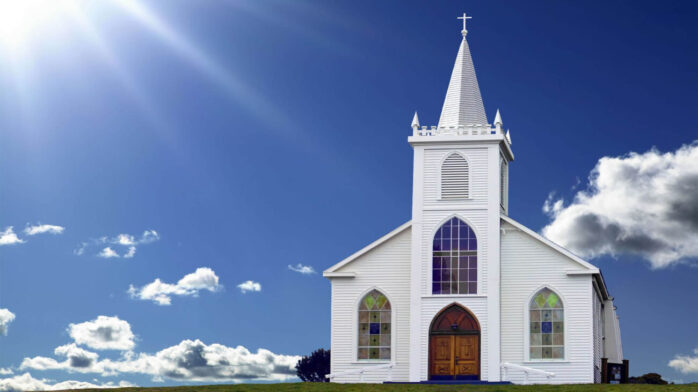
Are you a small church struggling to find comprehensive insurance coverage? Navigating the complexities of insurance can be overwhelming, but with the right tips, finding the right coverage doesn’t have to be daunting.
You can ensure that your church is secured and protected with our simple guide to finding the ideal policy.
Types of Insurance Policies Available

In order to sufficiently meet the insurance needs of small churches, it is important to consider the various types of policies available. The coverage that a chapel will need will vary depending on its location and activities, so an individualized approach should be taken when selecting a policy.
The most common small church insurance policies are public liability and product liability, property damage, workers’ compensation, auto coverage, employment practices liability (EPLI), directors and officers liability (DLO), and cyber insurance.
• Public liability and product liability
Public liability and product liability insurance cover the church’s liabilities arising from accidental injuries caused to members of the public or damage to their property. This coverage is often required by local laws in some states.
• Property Damage
Property damage protects against claims originating from accidental physical damage or loss to church property, including buildings, contents like furniture and equipment, furnishings, books, computers, etc., all owned by the church but stored off-site. Depending on individual circumstances, additional coverage may be needed for replacement costs or special items such as valuable artwork or musical equipment.
• Workers’ Compensation
Workers’ compensation provides financial support for employees who become injured or ill while performing duties related to church operations. This type of protection covers medical expenses related to the injury or illness as well as lost wages due to time off work recovering from an injury or illness. Generally, this form of protection is mandated by state laws but varies from one state to another.
• Auto Coverage
Auto coverage typically covers losses resulting from vehicle accidents that involve vehicles owned by the church such as vans used for youth missions trips. Smaller chapels with limited transportation needs might opt for non-owned auto coverage on their general policy in order to save money on premiums since own-vehicle accidents are often more expensive than those involving rented vehicles which make up the majority of losses in this type of policy.
• EPLI
Employment Practices Liability Insurance (EPLI) provides organizations with protection in case of employee complaints, such as those involving discrimination or sexual harassment at the workplace. This type of insurance also offers coverage against liabilities resulting from wrongful termination claims made by employees who were dismissed without cause.
Based on your Christian beliefs about how people should be treated in congregations, some small churches may feel that they do not require EPLI. However, it is advisable for all small churches to seriously consider this type of insurance before opting for self-insurance.
• DLO
Directors and Officers Liability Insurance provides legal representation for any claims against members of governing bodies held responsible either financially or criminally arising from decisions made which have caused financial hardship upon parties included within its effects. This type is often found useful during major transitions like mergers Of switches faith denominations changes leadership etc.
Understanding the Risks

Small churches often face a wide range of risk exposures that, if left unchecked, could put their financial security and future at risk. While they are usually somewhat protected by the law, they may still be exposed to a variety of risks associated with operations, property damage, and personal injury claims. To ensure the church is fully covered from potential losses, it’s important to understand the risks in order to identify the best type of coverage for its needs.
They may be exposed to a variety of risks including:
- Property Damage: In addition to sudden or accidental loss from events such as fire or flooding, small churches are also responsible for any damage caused by normal wear and tear on buildings and/or equipment. They may also be more vulnerable to theft or vandalism which should also be taken into consideration when looking into coverage options.
- Liability Claims: Liability claims not only to protect the church in the case of third-party bodily injury or property damage linked to its services—such as slips and falls—but they can also protect against various types of negligence claims related to church services provided offsite such as retreats or conferences hosted in another facility.
- Workers Compensation: Operating a small church often means hiring staff members who perform tasks within the facilities which may require specific types of insurance – depending on what jurisdiction your small church resides in you may need workers’ compensation insurance along with comprehensive liability insurance should any accidents happen related to your staff’s activities.
Key Considerations When Choosing an Insurance Provider
Some questions to ask as you begin your search for an insurance provider are:
- What type of coverage is provided?
• How much does it cost?
• Does the provider offer discounts for insuring multiple churches, or a particular type of church?
• Is there a satisfaction guarantee with the policy, should you need to make a claim?
Obtaining insurance can feel like an overwhelming task, but with the right considerations in mind, it is possible to find a plan that meets your specific needs. You’ll want to compare policies from multiple insurers in order to ensure that you’re getting the best possible coverage for your church at an affordable price.
When comparing policies and providers, consider things like deductibles, exclusions or limits on coverage, claims processing times, and service fees. Additionally, research whether or not there are any state or federal requirements that must be met in order to purchase certain types of insurance plans. A good insurance provider will work closely with you throughout this process in order to customize the policy that meets all of your needs.
Benefits of Working with an Insurance Broker

Because no two churches are identical, it’s essential to consider the financial and religious protection that comes with working with an insurance broker. Insurance brokers can help you find the right coverage for your congregation by breaking down the details of each policy and ensuring that every requirement is met. Furthermore, they are experienced in church-specific coverage and can provide meaningful advice as to risk mitigation and proper claim resolution.
By working with an insurance broker, you will benefit from their expertise in identifying the risks that apply to your small church and providing coverage options that meet both your legal compliance needs and budget requirements. A good broker will have experience in both business entities as well as special events like fundraisers, weddings, or other events hosted by the institution. This specialized knowledge allows them to better serve both secular organizations like churches rather than offering a “one size fits all” solution. They will also be able to navigate your institution’s insurance needs even if there haven’t been any previous claims or issues with coverage.
Conclusion
Church insurance can be confusing and a bit overwhelming. However, with the right knowledge and resources, you should be able to find coverage that meets your needs. Start by doing your research, understanding what types of coverage are available, and comparing quotes from different providers to make sure you have the coverage you need at an affordable price. With these tips in hand, you’ll be well on your way to finding the perfect insurance policy for your organization.











